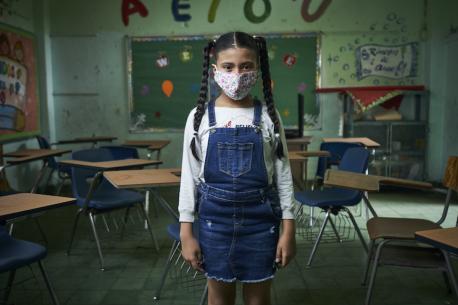
UNICEF Urges Action to End ‘Catastrophic’ Education Emergency
Schools have been completely closed for almost a full year for more than 168 million children worldwide, according to new UNICEF data showing one of the most jarring impacts of COVID-19 lockdowns.
Another 214 million children globally – or 1 in 7 – have missed more than three-quarters of their in-person learning — with potentially devastating consequences for children's well being and future development.
In sharing its latest analysis, UNICEF renewed a longstanding call for governments to prioritize the reopening of schools to end a "catastrophic education emergency." The most vulnerable children and those unable to access remote learning are at an increased risk of never returning to the classroom, often forced into child marriage or child labor.
And for the majority of schoolchildren worldwide, school is the place to go to interact with peers, seek support, access basic health care — including vaccinations — and get a nutritious meal. The longer schools remain closed, the longer children are cut off from these critical services — and an essential element of childhood.
“With every day that goes by, children unable to access in-person schooling fall further and further behind, with the most marginalized paying the heaviest price," UNICEF Executive Director Henrietta Fore said. “We must prioritize reopening schools, and we must prioritize reopening them better than they were before.”
As students return to their classrooms, they will need support to readjust and catch up on their learning. School reopening plans must incorporate efforts to recover children’s lost education. UNICEF urges governments to prioritize the unique needs of every student, with proper services in place to support remedial learning, mental health, protection and other needs.
Here's a look at how some schools are bringing kids back to the classroom with UNICEF support.

© UNICEF/UN0393009/Haro
Like most families in Niger, the parents of sisters Soraya, 10, left, and Assiatou, 6, struggle to make ends meet, leaving little leftover for items like school backpacks. "We live life day by day," says Fati, the girls' mother. "For the poor like us, our dream is that one day our children can be independent and take care of each other. That's why school is my only hope for them." As schools reopen in the country, UNICEF and partners are supporting over 50,000 primary teachers with training in remedial instruction and by providing workbooks and other refresher course materials.

© UNICEF/UNI329515/
As more and more schools reopen, measures like handwashing stations, physical distancing and mask wearing are being integrated into school life. Above, primary school students in Lo Cai, Vietnam queue on arrival to have their temperatures checked.

© UNICEF/UN0373712/Chol
Daniel, 17, shows off his freshly-washed hands outside Nile International Academy in Juba, South Sudan, in accordance with a new school rule that requires washing with safe water and soap before entering the classroom. Daniel's school reopened on Oct. 27, 2020, after a six-month COVID-19 shutdown. Some of Daniel's classmates — some of them girls forced into early marriages — did not return.

© UNICEF Mali/2021/Crenn
At Walirdé’s school in Sévaré, Mali, students received information about staying safe from COVID-19 from UNICEF through partner Apidev, a local NGO. Since the beginning of the pandemic, UNICEF has been working to raise awareness of the health risks while providing sanitation and hygiene supplies needed to strengthen infection prevention and control at schools and elsewhere in communities.

© UNICEF/UN0353433/Wilander
Above, teachers at SDN Sukamaju primary school in Bandung, West Java province, Indonesia, mark classroom desks and chairs to ensure that students keep 6 ft. apart from each other to prevent the spread of coronavirus.

© UNICEF/UN0398162/Karimova
An 8-year-old student reads from her Russian language textbook at Kozhakeldy Batyr School in the remote village of Aksuat, East Kazakhstan. In response to COVID-19, the school limited classroom access to pupils in grades 1-4, with no more than 15 children in class at a time.
© UNICEF/UN0392354/Ayene
Sumaya, 14, of Ethiopia is happy to be back at school after an 8-month shutdown. Her dream is to go to university and become a doctor. In 2020, UNICEF installed hundreds of handwashing stations and helped upgrade sanitation and hygiene at thousands of schools in the country to support their safe reopening. UNICEF also helped produce a teachers’ guide outlining safety measures and how to provide psychosocial support to students.
To learn more about how UNICEF and partners are guiding national and local authorites, see Framework for Reopening Schools.
Help UNICEF continue to support governments as they take steps to reopen schools and keep kids safe.
To photo: Panama is one of 14 countries where schools have remained largely closed for almost a year, according to new UNICEF data. Eight other countries in Latin America are on the list. In the first seven months of the pandemic, children in the region lost four times more days of schooling, on average, and classrooms have been slower to reopen compared to the rest of the world. UNICEF is calling on governments to prioritize safe reopening of schools, while providing practical guidelines for doing so and support for improving critical water, sanitation and hygiene services in schools. © UNICEF/UN0359829/Schverdfinger
HOW TO HELP
There are many ways to make a difference
War, famine, poverty, natural disasters — threats to the world's children keep coming. But UNICEF won't stop working to keep children healthy and safe.
UNICEF works in over 190 countries and territories — more places than any other children's organization. UNICEF has the world's largest humanitarian warehouse and, when disaster strikes, can get supplies almost anywhere within 72 hours. Constantly innovating, always advocating for a better world for children, UNICEF works to ensure that every child can grow up healthy, educated, protected and respected.
Would you like to help give all children the opportunity to reach their full potential? There are many ways to get involved.





